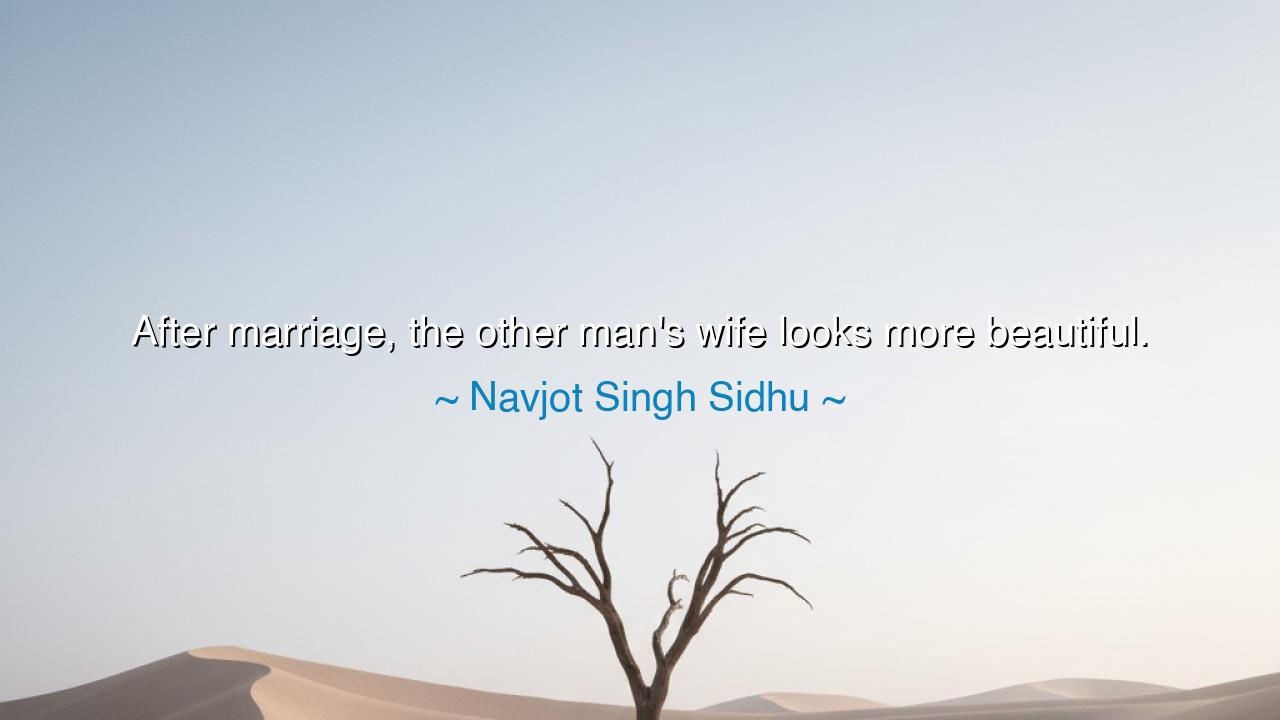
After marriage, the other man's wife looks more beautiful.






In the sharp, humorous, yet deeply revealing words of Navjot Singh Sidhu, we find a truth that lies hidden beneath laughter: “After marriage, the other man’s wife looks more beautiful.” Though spoken in jest, these words carry the echo of ancient wisdom. They speak not merely of marriage or desire, but of human nature itself—our endless yearning for what lies beyond our reach, our tendency to see distant fields as greener, and to take for granted the treasures already within our grasp. Beneath its surface humor lies a mirror, showing us the restless heart of humankind.
In every age, sages and poets have spoken of this longing—the shadow of discontent that follows even the happiest of souls. When Sidhu speaks of “the other man’s wife,” he does not simply mean another person’s partner; he speaks of the eternal illusion that beauty and joy dwell elsewhere, that fulfillment lies just beyond the edge of our own lives. It is the same spirit that makes a man chase power after gaining wealth, or long for freedom after finding love. The heart, when untamed, sees not what is, but what might have been. This, the ancients called Maya—the great illusion of human desire.
Consider the tale of King David from the old scriptures. He was a man of immense power, wealth, and divine favor. Yet when his eyes fell upon Bathsheba, the wife of another, desire clouded his wisdom. Though he had wives, concubines, and the blessings of heaven, he coveted that which was forbidden. His longing brought not joy, but ruin—showing that coveting what is not ours blinds us to the blessings we already hold. Sidhu’s jest, then, becomes a moral parable: the human heart, unless disciplined, is a wanderer—seeking always the mirage, never the water.
In truth, the beauty of the unfamiliar is born of distance. What we do not possess, we imagine as perfect; what we live with daily, we see in its flaws. The wife we know, with her voice, her habits, her human imperfection, becomes familiar; the woman afar, seen through the veil of mystery, becomes idealized. The same is true in all of life: the untraveled path seems brighter, the unchosen destiny nobler. This is the mind’s trick, a whisper that says happiness lies elsewhere. But the wise know that such chasing only leads to emptiness—for desire grows not by fulfillment, but by feeding on itself.
Let us then look to the example of Socrates, who, though married to the famously sharp-tongued Xanthippe, once said, “By all means, marry; if you get a good wife, you'll become happy; if you get a bad one, you'll become a philosopher.” His wit concealed a profound lesson—that love and contentment are not gifts bestowed by fortune, but virtues forged by patience and understanding. The secret of happiness lies not in seeking a perfect partner, but in learning to see perfection in imperfection. The eyes that constantly wander cannot see truth; only the heart that stays and tends can make beauty bloom.
Sidhu’s words, then, remind us that the disease of comparison is the thief of peace. When a man constantly measures his life against another’s, he becomes blind to his own abundance. The other man’s wife, the other man’s fortune, the other man’s fate—all seem more radiant only because they are seen through the haze of envy. True joy begins when one learns to polish one’s own lamp instead of gazing at another’s flame. Gratitude is the alchemy that turns the ordinary into the extraordinary.
So, children of the future, hear this teaching well: the world will tempt you with illusions of greener meadows, of fairer faces, of easier lives. Resist the mirage. Cherish what is yours. The beauty of another will fade when you learn to behold the wonder that already surrounds you. Do not let habit dull your vision; look upon your beloved, your home, your life as if seeing them anew each day. Love deepens not by change, but by constancy.
And thus, from the laughter of Sidhu emerges the wisdom of the ages: the restless heart finds no peace, but the grateful one reigns forever content. Learn to see with eyes of appreciation, and the world will reveal its hidden splendor. For the greatest beauty is not in “the other,” but in the familiar made sacred through love, devotion, and gratitude.






AAdministratorAdministrator
Welcome, honored guests. Please leave a comment, we will respond soon